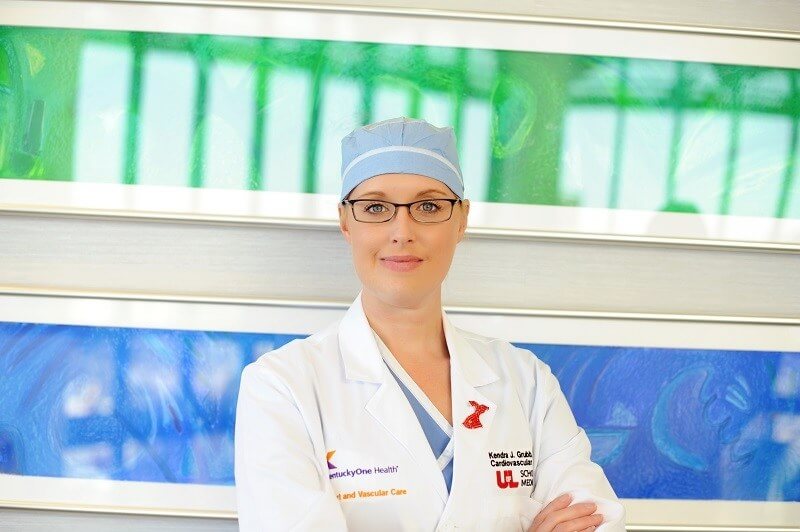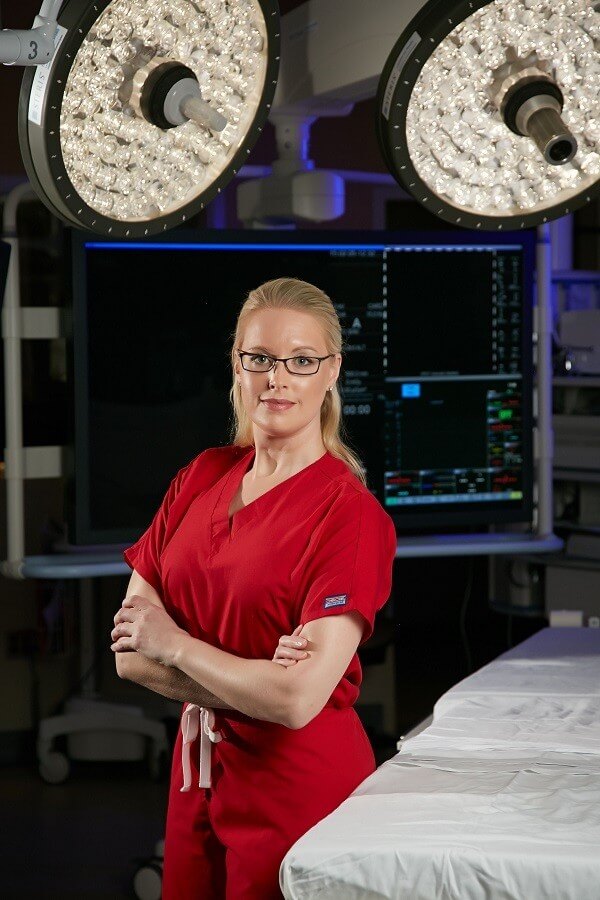StyleBlueprint Louisville is excited to announce our new partnership with KentuckyOne Health, which is now the underwriter for FACES of Louisville. As the largest health care provider in the Commonwealth of Kentucky, we look forward to their valuable insights and contributions with health and wellness for our audience.
When we first met Dr. Kendra Grubb, she was finishing up a surgery, walking out to get her pictures taken and then returning to her patient. We took pictures of her in scrubs because this best exemplifies who she is. She is devoted to her job as assistant professor of Cardiovascular and Thoracic Surgery and director of Minimally Invasive Cardiac Surgery at the University of Louisville and Jewish Hospital. She is also devoted to bringing awareness to the heart health of women. She practices what she preaches, leading a healthy lifestyle and balancing her intense job with monthly travel to wonderful places all over the globe.

Heart disease is the number one killer of women. Your mission is to educate women on the symptoms of heart disease and/or a heart attack, as they present differently than what most people think. Tell us about this.
The “Hollywood” heart attack, which is crushing pain on the left side of the chest extending to the jaw and left arm, can certainly be the first presentation of a heart attack in a woman. However, women are more likely to have “atypical” symptoms when they are having a heart attack: nausea, sweating, stomach pain or general fatigue. These more subtle symptoms are often overlooked, not only by the woman, but also by the health care providers caring for her.
Women should be talking with their doctors about heart disease every time they see a doctor. One in four women will die of heart disease, and we spend our time talking about breast cancer. All forms of cancer combined will not take as many lives of women as heart disease each year.
Kentucky is ripe for heart disease, with poor health habits coupled with a lack of education on both the patient and caregiver. What things, on a very basic level, can we do to be more heart healthy?
Number one: stop smoking. This is one of the biggest contributors to heart disease and can have the biggest impact on your health if you decide to quit. Other choices: daily exercise (even 20 minutes of walking counts), control of blood pressure, heart-healthy diet and diabetes control.
Another important part about choosing a healthy lifestyle is the impact it makes on the rest of the family. If a woman chooses to cook heart-healthy meals, her family benefits, and her children learn to eat healthy. If she decides to walk for 30 minutes every night with her kids, instead of watching television, she not only helps her health and decreases her risk of heart disease, but she also helps to decrease the risk in her children.
Recently, you did a live heart surgery that was aired on the Internet. It was a surgery where you replaced a valve and the patient was still awake. Are these surgeries going to become more common? But mainly, was it hard to operate and give play by play at the same time?
The surgery was a transcatheter aortic valve replacement (TAVR), a procedure done for patients with severe aortic stenosis, restriction of the main outflow valve of the heart, who are too high-risk for traditional surgery. Because the TAVR is done by a Heart Valve Team, I was able to easily describe the operation from my role as the secondary operator while my colleague was the primary operator. Also, at least once a month, I participate in the Pulse of Surgery, a program designed to educate middle school and high school students about heart health and heart surgery. The students have a live video feed directly from the operating room and are able to ask questions throughout the operation. This experience has prepared me for the live TAVR that was aired on the Internet.
The awake TAVR is only for centers with a well-established Heart Valve Team. It has become routine for us at Jewish Hospital and allows for the patient to go home the next day.

You are one of few women in your field. Do you see that as a huge opportunity for yourself? Has it been hard playing in a “boys club?”
Cardiac surgery has been known as the “boys club,” and being female in a male-dominated profession can certainly have its challenges. But like anything, with challenge comes opportunity. I don’t necessarily believe being a woman in the “boys club” is a huge opportunity, but it affords me the ability to approach patient care in a nontraditional way. I believe in the Team approach–with the patient in the center, we each contribute our expertise and in the end, the patient receives a higher level of care than any one individual could provide.
What are some things you do to take care of yourself? How do you live “heart healthy?”
First off, I don’t smoke; I have never even tried it once. In addition, I eat a heart-healthy diet with fruit or veggies with every meal. I also try to be active, and remember every step counts. I use the app on my phone to keep track of my steps throughout the day. I set a goal of 7,500 steps, or the equivalent of just over 3½ miles. It sounds like a lot, but if you choose to take the stairs instead of the elevator, or walk to lunch instead of drive, the steps add up. Without even trying, I regularly walk over 10,000 steps or five miles in a day!
Give us a peek at your agenda. What’s a typical day or week like for you?
The alarm buzzes at 5:30 a.m., and I get to the hospital by 6:30 a.m. First on my agenda is to evaluate my patient who is scheduled for the first surgery of the day. Afterward, I head to the intensive care unit (ICU) and see the patients who have had surgery or are too sick and awaiting their operation; this typically takes 45 minutes to an hour. At 7:30 a.m., the first operation starts and a typical heart surgery lasts four hours. As soon as the operation is complete, I meet the patient’s family and review the operation and discuss with them what to expect next. The second operation of the day usually starts around 1 p.m.; in the time between I see my patients who are in the hospital who are recovering and getting ready to go home and also new patients who are awaiting surgery. I also try to grab some lunch, catch up on phone calls and complete any administrative work. If the second surgery starts at 1 p.m., I hope to be finished by 5 p.m. After the second operation, I see any outlying patients, round in the ICU and typically have an evening meeting. It is my goal to leave the hospital between 7 p.m. and 8 p.m. But the day rarely ends then.
I am an academic surgeon, an assistant professor of Surgery in the Department of Cardiovascular and Thoracic Surgery, so in addition to patient care and operating, I also teach students at the medical school. I am the advisor for the Cardiothoracic Student Interest Group, participate in national trials and research studies, and am committed to contributing to the body of knowledge in Cardiovascular Surgery by writing manuscripts for publication and presenting at national meetings. In addition, last year I started the Louisville Symposium on Heart Disease in Women to raise awareness. So, needless to say, I may leave the hospital by 7 p.m., but the day is far from over.
Friday is a little different, because I see patients in a clinic setting, similar to going to the doctor. Sometimes I will do an operation in the middle of the day between the clinics, but I prefer to use the time for administrative needs (paperwork). In addition to the regular work day, I take call one to two nights a week and one weekend a month. Basically, that means I am responsible for any emergencies during that time. Fortunately, it doesn’t happen often, but this can mean taking care of a sick patient all night or even operating all night long.
I hear you like to travel. How do you balance this with a very demanding professional life?
I define myself as a “student” and never want to stop learning about the interesting people and places around the world. During training, when I would often work 80 to 120 hours a week, I started traveling as a way to decompress. I would take one trip a month and four weeks a year to leave surgery behind. I have continued this now and believe it is a key to living a balanced life. I always have a new adventure to look forward to!

Who are your mentors, and what advice do you treasure?
I have had many mentors over the years and each has given me amazing advice. A few treasures I have collected over the years:
“Don’t be afraid to be told ‘no.’ You have nothing to lose.”
“If you can dream it, you can do it.”
And my personal favorite, “TO DREAM anything you want to dream is the beauty of the human mind. TO DO anything you want to do is the strength of the human will. TO TRUST YOURSELF to test your limits is the courage to succeed.”
Fill in the blank. You’ll never see me without my:
Makeup on.
Where can we find you hanging out around town?
The newest restaurant or at hiko-A-mon (it’s my new favorite for sushi.)

What’s your bucket list travel destination?
Scuba diving in the Galapagos Islands
Favorite thing to do in Louisville:
Listen to live music
Night owl or early bird?
Both, but I’m a morning person.
What do you do during that “quiet time?”
Read or listen to music

Tell us some of your favorite local restaurants.
hiko-A-mon is now downtown and is a favorite for sushi. I also love Bistro 1860, Decca, Milkwood and Ward 426. There are too many great spots in Louisville!
What’s on your personal reading list right now?
Right now, I am reading a few books; I always have a couple I am reading. From classic fiction: Magic Mountain by Thomas Mann; biography: Wild by Cheryl Strayed; and nonfiction: Leading Change by John P. Kotter
Lightning round! Give us your:
- Candy or junk food splurge: chocolate chip cookies or anything dark chocolate
- Guilty pleasure song: “Welcome to the Jungle” by Guns N’ Roses
- Tearjerker movie pick: Dead Poets Society
- Standby nail polish color: Bus Stop Crimson by Orly, but only for the toes, I wash my hands too much to keep on nail polish.
- Favorite cocktail: Gray Goose and soda with a lime
Thank you to KentuckyOne Health, our underwriter for FACES of Louisville.
On May 16, Dr. Kendra Grubb will lead a symposium on heart disease for women. There will be talks on healthy lifestyle, stress, as well as chair massages, tai chi and yoga classes all day. There will also be classes on the Mediterranean diet. This will be at Jewish Hospital, the Rudd Heart & Lung Center, 16th Floor Conference Center, 201 Abraham Flexner Way, Louisville, KY, 40202. For more information, call (502) 588-7600 or click here.
As always, much gratitude to our FACES photographer, Adele Reding, for her fantastic work. Visit her website at adeleredingphotography.com.





















